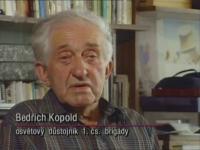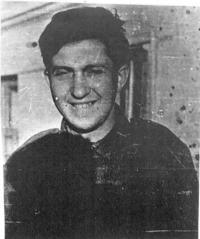“We couldn’t tell the soldiers to be courageous, and then sit at the back.”

Download image
Bedřich Kopold was born on the 10th of January 1921 into a Jewish family in Moravská Ostrava. He was among a group of Jews deported to the no-man’s land between the Wehrmacht and the Red Army in Poland. He made use of the as yet benevolent attitude of the Germans and fled to the USSR. He worked in the Donets Basin and in Central Asia. When the Czechoslovak unit was formed, he left for Buzuluk. On the 24th of February 1942 he was signed up to the 1st Czechoslovak Independent Field Battalion. He took part in the fighting at Sokolov. He then served as a political officer of the 1st Czechoslovak Independent Brigade. After the war he worked together with Bedřich Reicin. In the ’50s, he was sentenced to 18 years of jail, his wife Jiřina and their two children were imprisoned for two years. After his release he worked for ČVUT (Czech Technical University) in Prague. He was rehabilitated in 1956 (1958). He died on the 7th of March 2007. He wrote articles about the Czechoslovak foreign resistance in the East during World War II and about the Holocaust. He also wrote biographical profiles.


